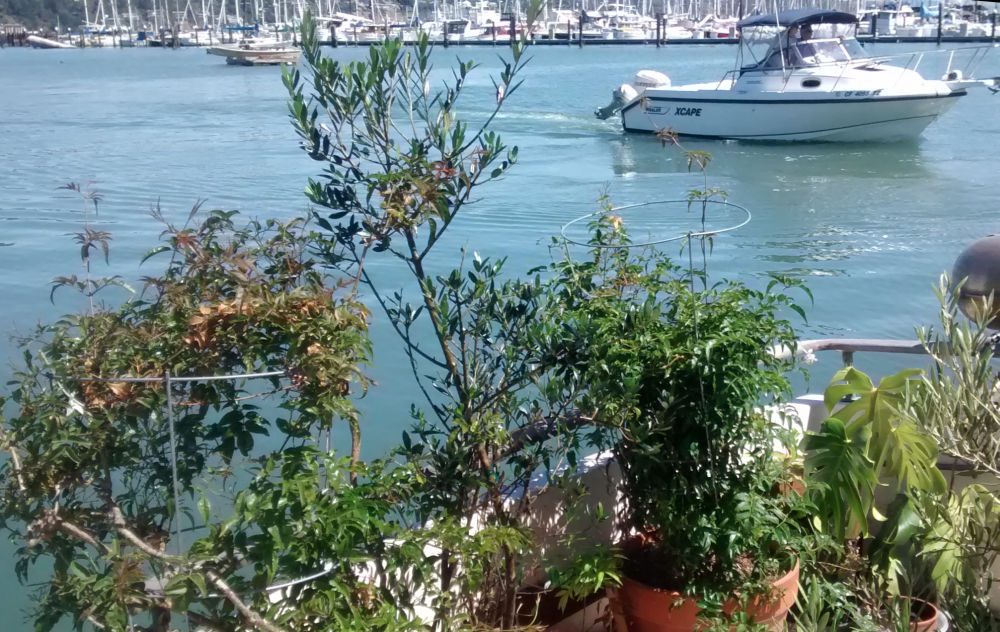
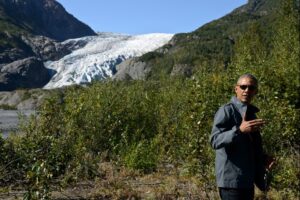 I left the joyful energy of my houseboat in Sausalito to catch a flight to Mexico City.
I left the joyful energy of my houseboat in Sausalito to catch a flight to Mexico City.
This was around the time President Obama was preparing to head to Alaska and to hike the peaks to provide a dramatic visual backdrop to his message about the need for urgent international action on climate change.
I was headed to the International Meeting on Campesinos Economy and Agroecology in America as a gathering designed to strengthen the movement of campesinos (peasants) fighting for food, water and land sovereignty through agro-ecology, the science behind sustainable agriculture. This gathering would also be discussing the devastating impact the Trans Pacific Partnership promoted by President Obama would have on small scale farmers and galvanizing a stronger resistance movement to GMO.
And so I entered a space where hundreds of peasants were deeply engaged in intellectual, spiritual and practical conversations about seed sovereignty, land and indigenous wisdom. This was a space to discuss how to radically shift from the corporate led Green Revolution and agri-business to a human centered grass roots approach that places reverence for life and relationships and nutritious food at its core.
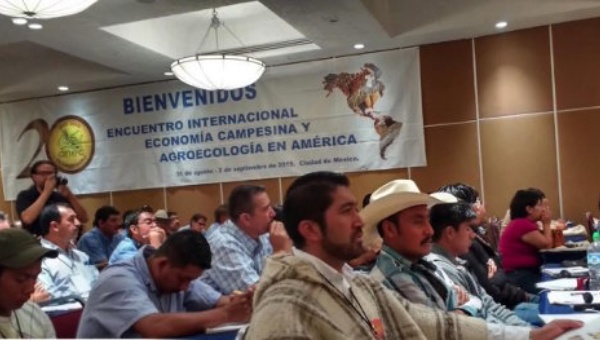
These peasants were seeking to be valued rather than seen as poor and needing charity. They wanted to be recognized for their intrinsic value as small producers and as the best defense against climate impact.
Speakers talked about governments channeling millions of dollars to a small number of large producers, yet peasant farmers produce two thirds more food at almost a third of the cost. As Dr. Sergio Barrales Dominiguez (Rector of the Universidad Autónoma Chapingo in Mexico) said,
“We are facing a food problem… if we do not change the course of agriculture in this country and the world then we will reach a point of no return. It is not the same to eat as to be nourished. Agro-ecology is key to climate change response and to the continuation of the human race.”
When the International Assessment of Agricultural Knowledge, Science and Technology for Development conducted a study involving 400 scientists in 80 countries who were asked to determine the best technology for the world facing an increasing population, they concluded that agriculture needed an about face and that agro-ecology provided some of the most robust set of solutions to the environmental pressures and crises currently facing agriculture and the world.
President Obama was also sounding a clear warning about climate change impact from the Arctic, and his voice and message was so welcome. However, both his green light to Shell drilling in the Arctic Ocean and his commitment to the Trans Pacific Partnership will exacerbate climate impact. It will mean the production of more food for export rather than consumption in Latin America, and an increase in the production of exotic products rather than staple food for a good diet. In support of export-focused economies, more land is being given to multinationals and denied to peasants, while corporations continued to drive unsustainable and undesirable development.
Even worse, many areas are becoming the subject of land grabs and ghost areas. Miguel Altieri, Professor of Agro-ecology at UC Berkeley says there are currently 460 land grabbing projects being undertaken by countries including China and Saudi Arabia and they are using these areas of land to produce export crops for their own countries. In countries like Colombia economic brokenness resulted in peasants disappearing from the land and joining armed groups. Men were leaving the land in search of the American dream because the dreams of their own countries were not there to hold them.
 Academic Dr. Gisela Espinolsa Damian says women are staying behind and there is now a massive imbalance between women and men in rural areas and a feminization of countryside. As a result, women are assuming triple roles without sufficient resources to survive in many areas. Few women have access to land and property and they struggle with the expectations of family, household chores and land to care for their families, generate income and have time to eat, sleep and recover strength.
Academic Dr. Gisela Espinolsa Damian says women are staying behind and there is now a massive imbalance between women and men in rural areas and a feminization of countryside. As a result, women are assuming triple roles without sufficient resources to survive in many areas. Few women have access to land and property and they struggle with the expectations of family, household chores and land to care for their families, generate income and have time to eat, sleep and recover strength.
Furthermore, women’s work largely goes unnoticed in the national accounts. Official statistics in Mexico show that only 12 per cent of the Economically Active Population in the agricultural sector is female, while unofficial surveys Mexican peasant and indigenous movements indicate that 85 per cent of rural women engage in agricultural work, most of it non-remunerated.
And yet these women are rising up and organizing. Countering this decline of small-scale peasant production and the unstoppable wave of mostly male migration is the ‘explosion of women’s political participation…and demand for gender equality and rights’, stories of which were shared at this conference.
Between conference sessions I indulged myself in large bowls of fresh watermelon. I’d not tasted such red and luscious watermelon for a long time. Especially watermelon with black seeds!! How ironic that the watermelon I grew up with as a girl was now the one I was eyeing as an exotic specimen due to seeds being bred out of watermelons in the US to give people a seedless (and much more bland tasting) watermelon.
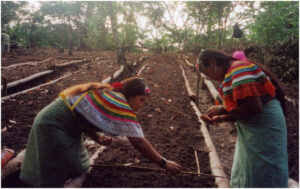 Seeds were the center of many conversations at the conference in terms of how to regain seed sovereignty and retain seed wisdom and seed banks. This was especially urgent in places like Venezuela which was experiencing a deep food crisis as a result of its total dependency on industrial agriculture and exported products and with sustainable organic practices and local products such as cacao and lime being lost.
Seeds were the center of many conversations at the conference in terms of how to regain seed sovereignty and retain seed wisdom and seed banks. This was especially urgent in places like Venezuela which was experiencing a deep food crisis as a result of its total dependency on industrial agriculture and exported products and with sustainable organic practices and local products such as cacao and lime being lost.
According to Miguel Altieri, Professor of Agro-ecology at UC Berkeley, 80% of 1.5 billion hectares of land is under monocultures. Industrial agriculture occupies 80% of agricultural land, uses 70% of water and only produces 30% for food due to bioplastics and biofuel use. This approach has spurred on new species of weeds, new pesticides and increased use of chemical fertilizers. It has also resulted in ‘dead’ areas of ocean, such as the Gulf of Mexico – caused by industrial agriculture and bio-toxins. In contrast, says Dr Clara Nicholls, President of the Latin American Scientific Society of Agro-ecology in Colombia, peasants produce 50% of the world’s food using 30% soil, 30% water and 30% fossil fuels.
To change the direction of resources and power we need to get organized and mobilize as consumers in order to more urgently influence food policies and practices. This includes recognizing that eating is a political act. And so is buying.
Osprey Orielle Lake, Executive Director of WECAN , says that 80% of purchasing power in North America is decided by women. So we need to better connect rural and urban movements for change and a movement that galvanizes the power of urban purchasing, given that 80% of people live in urban areas. Of course this is starting to happen, for instance a 2009 class action filed by 53 citizens (farmers, consumers, environmentalists in Mexico in relation to genetically modified maize contaminating native maize was successful in 2014.
, says that 80% of purchasing power in North America is decided by women. So we need to better connect rural and urban movements for change and a movement that galvanizes the power of urban purchasing, given that 80% of people live in urban areas. Of course this is starting to happen, for instance a 2009 class action filed by 53 citizens (farmers, consumers, environmentalists in Mexico in relation to genetically modified maize contaminating native maize was successful in 2014.
Listening to the farmers speak, it struck me as deeply ironic how little they are recognized as educators and wisdom teachers who are given voice, visibility and translation of this knowledge into academic curriculums and broader learning at local, national and international levels when they have the ability to feed and heal the world.
Peasants represent a natural teaching and learning community in their relationship with land, food and nature and in their ability to create products such as bio-fertilizers and bio-compost. And while technology has a powerful role to play in supporting peasants in their communities, it needs to be on their own terms in determining how they want to use technology. As Sebastian Pinheiro, head of the Juquira Candiru Foundation in Brazil said, “We will give shoes to technology so it can walk side by side with us.”
The conversations around addressing climate change impact are intensifying in the lead up to the Paris Climate ConferenceNovember 30th – December 11th , and of course the approach by governments is now influenced by the language and focus of the new sustainable development goals. Governments have new targets to honor and they will be seeking mechanisms and approaches to realize these commitments, including women’s role in relation to climate change action.
 It’s clear that the most powerful way to address the impact of climate change is to invest in agro-economy, since peasants can reduce greenhouse gases by more than half as a result of community soils being returned to the earth. To do this, we need to change the way current food systems are structured so that populations can be nourished and not just fed. As Dr. Francois Houtart, Institute for Higher Studies in Ecuador has said “we are facing a problem not of food scarcity but food distribution and the way we’re organizing food, so that even those producing food are malnourished.”
It’s clear that the most powerful way to address the impact of climate change is to invest in agro-economy, since peasants can reduce greenhouse gases by more than half as a result of community soils being returned to the earth. To do this, we need to change the way current food systems are structured so that populations can be nourished and not just fed. As Dr. Francois Houtart, Institute for Higher Studies in Ecuador has said “we are facing a problem not of food scarcity but food distribution and the way we’re organizing food, so that even those producing food are malnourished.”
This lack of access to food is a consequence of agribusiness and the industrial production of food, which results in disease and obesity. Industrial agriculture is shutting down the production of oatmeal, amaranth and other grains to allow children to have nutritious breakfasts rather than sugary breakfasts. The increase in ADT and diabetes is linked to sugary food and drinks.
Dr. Pierre Vuarin, Foundation for the Progress of Humanity shared with us that problems related to food represent 7% of total cost of health systems. What we need to do is shorten and strengthen the food chains and bring them as close as possible to people. We need to encourage a movement of urban activists as much as peasant farmers including urban farming, kitchen gardens and rooftop gardens … even boat gardens! We need to address the high level of waste in restaurants and hospitals and create new forms of waste management that give new value to waste as energy source such as fertilized organic trash for organic soil.
We also need to mobilize to end deforestation if we don’t want to see the Amazon Rainforest disappear within 40 years leaving nothing but a desert savannah. The Amazon and other sacred territories are under threat due to logging and hydro-schemes and general plundering from many countries. In Indonesia we are seeing the decimation of forests as palm oil and eucalyptus are produced on an industrial scale. Peasants can no longer produce their own food such as rice or beans as they have no land left. Meanwhile ships sail the seas following the logic of liberalization and markets based on comparative advantages and selling at a lower price.
Back in San Francisco I caught part of the international Soil Not Oil gathering, inspired by Vanda Shiva’s book of the same title. Here one of my favorite writers, Fritjof Capra, spoke about the critical role agro-ecology can play in greatly reducing energy dependence, have a huge positive effect on public health and fight climate change by locking up carbon dioxide from the atmosphere in organic matter. Capra is renowned for his systems thinking, and now he says we must re-envision our world as a network, not as a machine. This network approach means embracing circular economics, localized knowledge, connection to nature, social capital and emotional and spiritual intelligence. This of course is the essence of agro-ecology. We heard at the conference that in China, where there is a robust movement for healthy food and sustainable agriculture, peasants are releasing fish into their rice fields as a natural means to recycle nutrients and control pests. In the same way they are including ducks in their fields so that their manure can help fertilize the soil.

As writer Margaret Wheatleyhas reflected, in the older, more mature cultures where people still live within the kinship circles of animals and human beings there is a connection with animals…as ‘powers’, as gifts or capabilities. For many peasants corn is seen in the same light.
At one point during the conference, the poet Mardonia Carballo said that speaking about corn is speaking about a human bridge between earth and the divine. What was first – corn or man? The plant needs the hand of man to spread seeds and corn helps man to survive. It’s time to plant … in times of arrogance like this we need to speak about the corn.
Unfortunately the global story on corn is bleak. Corn today has become a commodity with 85% of corn being GMO and used to fuel our cars, produce, industrial chemicals, food and livestock. And because the price of biofuels is directly linked to oil prices, the price of corn is also linked to oil prices. This displaces the connection peasants have had with corn founded on the basis of mutual respect, reciprocity and generosity.
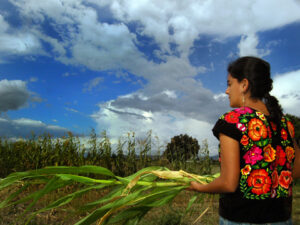
Peasants regard corn as sacred, believing that if we tend the corn, the corn will tend us. Women in Latin American countries are also involving their children in learning about corn and helping to collect and market the corn. As one woman said ‘children can glorify their mother’s work because they’ve been taken on the journey with their mothers and understand the journey of corn’. This also reinforces to children the central role their mothers play in the life of their family and community.
Women’s role in agro-ecology is central, from creating and sustaining seed exchanges, knowledge exchanges, clean water creation, waste management approaches, greenhouses, land management. Finding ways to support women playing more visible leadership roles in agro-ecology and climate change conferences and policy discussions is critical to better outcomes as well as women’s increased self-esteem, authority, independence and economic participation as growers, producers and sellers. In this respect, we need a Women and Climate Change initiative that will get more money into the hands of grass roots women’s groups toward supporting women leading sustainable agriculture and climate change work and supporting women to be at the leadership table for policy decisions around climate change mitigation and adaptation, given that women are at the frontline of climate change impact and are best placed to suggest strategies and solutions for their communities and countries.
[symple_testimonial by=”Gabriela Mistral” fade_in=”false”](I had a family of trees,
and another of plants,
and I talked and talked
with the animals I found.) [/symple_testimonial]
[/symple_column]
Current climate financing mechanisms are largely gender blind and are not focused on getting more money to grass roots groups and movements even though this is one of the most powerful ways to address climate change impact.
We need to do everything we can to influence the flow of policies, power, resources and funds to the hands of women’s groups and movements and peasant and Indigenous groups working to promote small scale farming. Small scale farming is also a natural defense against the massive increase in migration and the best opportunity for asylum seekers and migrants to start a new life and have access to food security when they have to leave their country and start anew in another. The image of Aylan Kurdi lying face down on a beach, being lapped by waves, is symbolic of the growing divide between rich and poor, between governments creating walls to protect citizens and those radically dislocated by conflict and fundamentalism, and between corporate led industrial agriculture and small scale farmer led agriculture. We need to recover our humanity and our reverence for life.
We’ve got to step up our mobilizing and actions for a new economic system, a human centered focus, a multi-sectoral movement approach that unites peasant, youth, women and environmental movements and one that bring together rural and urban communities. We must start right now in what we choose to eat, who we choose to vote for, where we give our money and time, what we speak about and how we speak about it and in the way we give voice and space to small scale farmers, especially women.
We know the power of influencing politics and political will. In the City of Richmond in the Bay Area where the Soil Not Oil conference was held, the Mayor shared that the City has in place a 100% ban on pesticides as well as a seed lending library and crop swaps program to grow more local seed and even a sister seed library scheme. In California we are now seeing the fierce political battle play out in response to proposed legislation requiring a 50% reduction in petroleum use by 2030. We can influence political will at every level.
 Back here in Sausalito, there’s an affirmation of people power, paddle power and pedal power as friends and families guide kayaks, water cycles and stand up paddles back toward the bay. On the shore I watch a dog, a bounding bundle of energy skidding in all directions, waiting frantically for its owner to paddle in.
Back here in Sausalito, there’s an affirmation of people power, paddle power and pedal power as friends and families guide kayaks, water cycles and stand up paddles back toward the bay. On the shore I watch a dog, a bounding bundle of energy skidding in all directions, waiting frantically for its owner to paddle in.
Energy in all its electric forms seems to ribbon me in love. I step outside my boat to check my organic garden, and that of my neighbors. Lettuce, basil, tomatoes, coriander, radishes, chilies, rosemary, lavender, an avocado plant…and, of course, mystical corn.
Jane Sloane
San Francisco

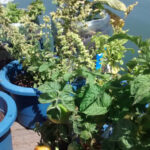

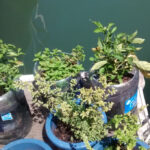


Great interview on Full Frame Jane. Very informative
Wonderful article. Thanks Jane. You are an incredible voice or justice. Keep it up.